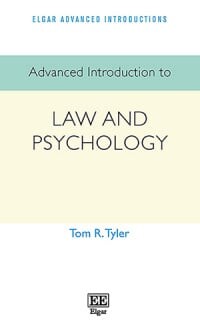In his new book Advanced Introduction to Law and Psychology (Edward Elgar Publishing, 2022), Macklin Fleming Professor of Law Tom R. Tyler opens with a story about an experiment conducted by psychologist Hugo Münsterberg.
In Münsterberg’s book
On the Witness Stand (1908), he writes about a staged attack that occurs in his classroom where students made mistakes in recalling the attack. The experiment demonstrated that eyewitnesses could make mistakes in what they see. This was the first experimental research done in the modern field of law and psychology, Tyler writes. It was immediately critiqued by John Wigmore, a leading legal scholar and law school Dean, beginning a century of sometime cooperative, sometime contentious connection between the field of psychology and the legal academy.
Describing psychology and law as an interdisciplinary marriage, Tyler uses relevant historical examples throughout the book to explore the opportunities and limitations of the two fields for students and scholars of law, psychology, and the social sciences.
Advanced Introduction to Law and Psychology outlines the main areas of research, their relevance to law and the way that psychological findings have shaped — or failed to shape — areas of law. The book focuses on the relevance of psychological theories to topics in law, emphasizes the institutional realities within which law functions and discusses the problems of bringing research findings into the legal system. The book covers major topics in the field, including eyewitness identification, interrogation, forensic science, racism and sexism, criminal responsibility, sentencing, rehabilitation, risk assessment, civil justice, decision-making by judges, prosecutors and juries and managing subjective harm.
Tyler is the Macklin Fleming Professor of Law and Professor of Psychology at Yale Law School and a Founding Director of The Justice Collaboratory. His research explores the role of justice in shaping people’s relationships with groups, organizations, communities, and societies. In particular, he examines the role of judgments about the justice or injustice of group procedures in shaping legitimacy, compliance, and cooperation. He is the author of several previous books, including Why Children Follow Rules (2018); Why People Cooperate (2011); Legitimacy and Criminal Justice (2007); Why People Obey the Law (2006); Trust in the Law (2002) and Cooperation in Groups (2000).





